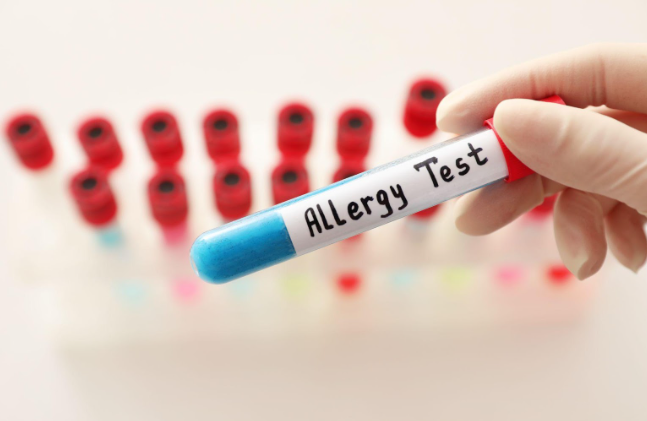Seasonal Allergies, Summer Colds or COVID-19: How to Tell the Difference and Find Relief
Seasonal Allergies, Summer Colds or COVID-19: How to Tell the Difference and Find Relief

When summer rolls around, most people look forward to warm weather, beach days, and barbecues. But if you find yourself sneezing, sniffling, or feeling run-down, the season might not feel so sunny. You may start to wonder if you're dealing with summer allergies, a summer cold, or even COVID-19.
While the symptoms can look a lot alike, the causes and treatments are different.
What Causes Seasonal Allergies in the Summer?
Seasonal allergies, or allergic rhinitis, happen when your immune system reacts to allergens in the air. In the summer, the most common culprits are grass pollen, mold spores, and even certain trees or weeds that release pollen during the warmer months. When your body detects these allergens, it treats them like harmful invaders and releases histamines, which lead to symptoms like sneezing, itchy eyes, and nasal congestion.
You might also be affected by indoor allergens like pet dander or dust mites, especially if your home has a lot of carpeting or you spend more time inside with air conditioning. These allergens tend to linger and can make allergy symptoms feel like they’re never-ending during the summer months.
The Summer Cold
A summer cold is caused by a viral infection, most often a rhinovirus or enterovirus. Unlike allergies, which are triggered by your immune system’s overreaction to harmless substances, a cold results from an actual infection. This means it can also spread from person to person, especially in crowded places like public transportation, airports, or summer camps.
Colds can happen any time of the year, including the summer. Hot weather doesn't make you immune to viruses. In fact, being in air-conditioned spaces, which tend to be drier and have less ventilation, can create an environment where viruses thrive and spread.
Don’t Overlook COVID-19
While summer colds and allergies are common this time of year, it’s more important than ever to consider COVID-19 as part of the differential diagnosis—especially if you’re experiencing symptoms like cough, sore throat, congestion, or fatigue.
COVID-19 has shown a pattern of increased cases during summer months in recent years, often fueled by travel, indoor gatherings, and relaxed precautions. Unfortunately, the symptoms can overlap significantly with both colds and allergies, making it difficult to tell the difference without testing.
Spotting the Differences in Symptoms
While both seasonal allergies and summer colds can cause sneezing, a runny nose, and fatigue, there are a few key differences to look out for. Allergies typically come with itchy eyes, throat, or ears, which are symptoms that are rarely present in a cold. Allergy symptoms also tend to last longer and appear suddenly after exposure to triggers, like mowing the lawn or going outside on a windy day.
A summer cold, on the other hand, may start with a sore throat and then evolve into congestion or a cough. You might also have a low-grade fever, muscle aches, or feel generally unwell. These symptoms develop more gradually and usually resolve within a week to ten days. Unlike allergies, colds don’t stick around for weeks on end.
If you’re experiencing upper respiratory symptoms—particularly if accompanied by fever, body aches, or loss of taste or smell—it's essential to take a COVID-19 test and consult your primary care provider at Sisselman Medical Group. Testing helps protect those around you and ensures you get the right treatment if needed.
How Duration Can Help You Tell the Difference
One of the most helpful clues when trying to figure out whether you’re dealing with allergies or a cold is how long the symptoms last. A cold will usually run its course within a week or so. You may feel tired for a few days after, but the sneezing, coughing, and sore throat should fade.
Allergies, on the other hand, can last all season. If you're still sneezing and blowing your nose after two weeks with no sign of improvement, you're likely reacting to allergens in your environment. The timing of your symptoms can also help you make an educated guess. If you always feel miserable around the same time each summer, then allergies are a likely cause.
Finding Relief From Summer Allergies
If seasonal allergies are making your summer miserable, the good news is that there are plenty of ways to find relief. Over-the-counter antihistamines can help block your body’s allergic response and reduce symptoms like sneezing and itching. Nasal sprays can also help relieve congestion and inflammation in the nasal passages.
You can also limit your exposure to allergens by keeping windows closed on high pollen days, using an air purifier, and showering after spending time outdoors. Even small changes like switching your air filters regularly and keeping pets off the bed can make a difference.
How to Treat a Summer Cold
There’s no cure for the common cold, but there are plenty of ways to ease your symptoms and help your body recover. For instance, your immune system works best when you’re well-rested and hydrated. Drinking plenty of fluids can also help thin mucus and keep your throat moist.
If you’re dealing with a sore throat or headache, over-the-counter medications like acetaminophen or ibuprofen can provide relief. Decongestants and saline nasal sprays may also help open up your nasal passages so you can breathe easier. And while you may be tempted to power through your day, taking it easy can help you bounce back faster.
When to See a Doctor
If you develop a high fever, experience shortness of breath, or have symptoms that worsen after a week, it’s a good idea to check in with your healthcare provider. You could be dealing with something more serious like a sinus infection, bronchitis, or even early signs of asthma, which can be triggered by allergies.
For allergy sufferers, seeing a doctor is also helpful if your symptoms aren't responding to over-the-counter treatments. You might benefit from allergy testing, prescription medications, or immunotherapy, depending on your specific triggers and how severe your reactions are.
Early diagnosis for COVID-19 is especially critical for individuals at higher risk of complications, such as older adults or those with underlying health conditions. In some cases, antiviral treatments may be appropriate, but only if COVID-19 is identified quickly.
Can You Have Both at the Same Time?
It’s absolutely possible to have both allergies and a cold at the same time, and unfortunately, they can make each other worse. Allergies can cause inflammation in the nasal passages, making you more vulnerable to viral infections. Likewise, a cold can irritate your respiratory system and make allergy symptoms feel more intense.
If you're struggling to figure out whether your symptoms are due to seasonal allergies or a summer cold, our team at Sisselman Medical Group can help. Don’t let sniffles and sneezes ruin your summer! Contact us today to take the first step toward lasting relief.











